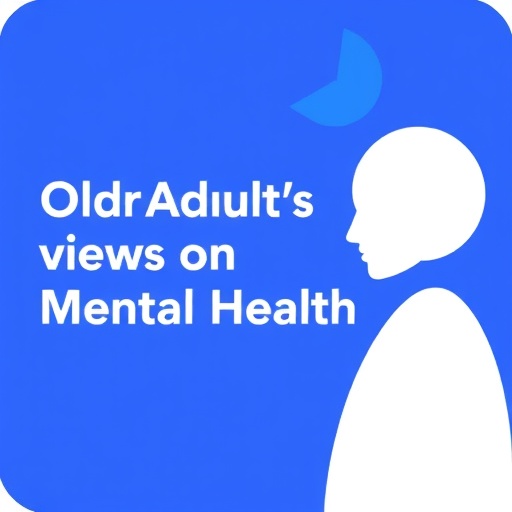In an era where digital technologies increasingly infiltrate everyday life, the mental health needs of older adults remain a critical yet oft-overlooked concern. In China, where the aging population is rapidly growing, novel digital solutions are being explored to address the challenges of mental health care accessibility and personalization. A groundbreaking qualitative study published in BMC Psychiatry in 2025 sheds light on how older adults perceive and interact with mental health support delivered through WeChat applets—a promising frontier in digital healthcare.
The study, conducted in Wuhan among sixteen older adults from four distinct communities, employed a robust qualitative descriptive design utilizing face-to-face semi-structured interviews. This approach allowed researchers to delve into the nuanced and personal perspectives of participants, capturing their firsthand experiences and expectations regarding mental health WeChat applets. The analysis of this rich qualitative data was performed through inductive content analysis, ensuring that findings emerged organically from participants’ voices.
One of the compelling revelations of the study is the diverse attitudes older adults hold towards mental health applets integrated within widely used platforms like WeChat. While some participants expressed optimism about the convenience and accessibility that such digital tools offer, others showed skepticism, fueled by concerns over privacy and the adequacy of digital interfaces tailored to their needs. These perceptions highlight the complex terrain on which digital health interventions must operate, balancing innovation with trust and usability.
Functional needs emerged as a crucial domain, revealing that older adults desire mental health applets that do far more than just basic symptom tracking. They expressed a need for tailored content that resonates with their cultural and generational contexts, interactive features that promote engagement, and integrated support systems that connect users with healthcare professionals and community resources. This underscores that user-centered design in mental health technologies must transcend mere functionality to encompass cultural relevance and accessibility.
Beyond functional features, the study sheds light on older adults’ preferences for the design and usability of mental health applets. Participants highlighted the necessity for intuitive interfaces with larger fonts, clear navigation paths, and simplified functionality to accommodate varying levels of digital literacy. These preferences illustrate that an effective mental health applet cannot adopt a one-size-fits-all approach; rather, it requires meticulous customization to the sensory, cognitive, and technical capacities of older users.
Data privacy and security were among the recurring themes in participants’ feedback. Older adults articulated apprehensions about data misuse and were keenly aware of the risks posed by digital platforms if transparency and stringent data protection measures are not enforced. This aspect signals an urgent call for developers and policymakers to prioritize transparent communication about data handling and implement robust safeguards to foster confidence among older users.
Interestingly, the research also reveals the importance of digital literacy support as an integral part of mental health applet deployment. Many participants acknowledged difficulties navigating digital tools and expressed a need for assisted learning programs or community workshops. Providing such support not only enhances user adoption but also empowers older adults to actively participate in managing their mental well-being through technology.
The implications of this research extend into public health policy and community health strategies. The authors advocate for incorporating mental health awareness and digital health literacy into broader health promotion programs that target older populations. This multi-tiered approach envisions engagement with healthcare providers, community workers, policymakers, technology developers, and family members to create a supportive ecosystem that facilitates the acceptance and effectiveness of mental health digital tools.
Moreover, the study’s findings stress that mental health applets should not function in isolation but rather complement traditional mental health services. The synergy between digital tools and face-to-face therapy, community engagement, and social support networks can produce a more holistic and responsive mental health care framework for older adults. Developers are encouraged to consider hybrid models that blend technology with human interaction.
This research also sheds light on technological innovation trends, suggesting that integrating features like real-time communication with counselors, personalized reminders, mood tracking, and cognitive behavioral therapy modules could enhance the utility of mental health applets. Importantly, these features must be designed with an eye to minimize cognitive load and accommodate sensory or motor impairments common in the elderly.
Access remains a pivotal challenge in digital mental health, especially considering socio-economic disparities. The study calls attention to barriers such as limited internet access, lack of suitable devices, and financial constraints that may hinder older adults from benefiting from WeChat-based mental health applications. Addressing these structural inequities is mandatory for equitable health outcomes.
The cultural context in China, where family plays an instrumental role in the care of older adults, is another aspect profoundly influencing the acceptance of digital mental health tools. The study discusses how integrating family members into applet design and support frameworks can enhance engagement, reduce stigma, and create shared accountability for mental wellness.
In summary, this qualitative investigation provides a comprehensive understanding of older adults’ perceptions and needs regarding mental health WeChat applets, highlighting essential facets such as user-centered design, data privacy, digital literacy, and policy integration. It signals a critical juncture where technology and geriatric mental health converge, presenting opportunities to transform mental health care paradigms for aging populations.
As the digital revolution continues to evolve, the lessons drawn from this study underscore the necessity of inclusive, transparent, and culturally sensitive digital interventions. They remind stakeholders that the success of mental health applets hinges not just on technological sophistication but on empathetic design and a multisectoral collaborative approach aimed at bridging the digital divide and optimizing mental health support for older adults worldwide.
Subject of Research: Older adults’ perceptions and needs regarding mental health support delivered via WeChat applets
Article Title: Older adults’ perceptions and needs regarding mental health WeChat applet: a qualitative study
Article References:
Qiu, Yf., Liu, Jl., Zeng, Lj. et al. Older adults’ perceptions and needs regarding mental health WeChat applet: a qualitative study. BMC Psychiatry 25, 889 (2025). https://doi.org/10.1186/s12888-025-07339-5
Image Credits: AI Generated




